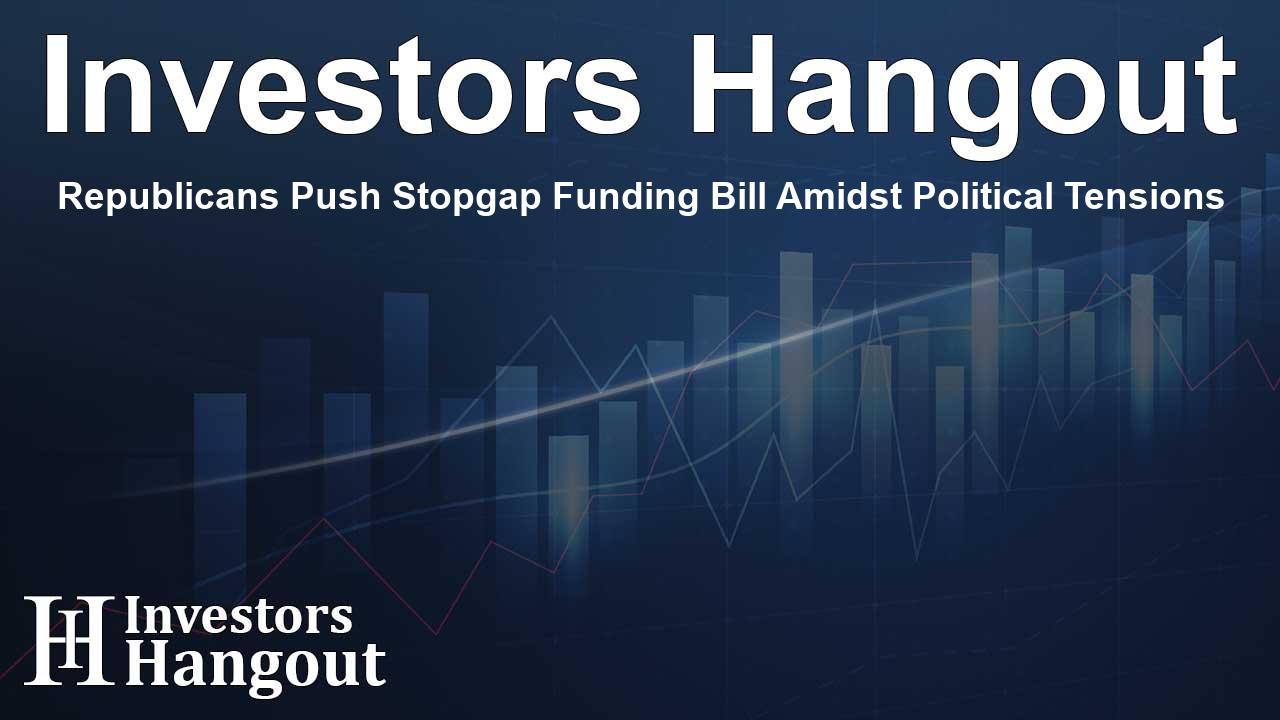Republicans Push Stopgap Funding Bill Amidst Political Tensions

Republican Leaders Push Forward with Funding Legislation
In a crucial move, the U.S. House of Representatives is preparing to cast a vote on a six-month stopgap funding bill introduced by Republican Speaker Mike Johnson. This measure comes at a critical time, as it is just weeks away from a potential government shutdown.
Contentious Provisions Lead to Debate
One notable aspect of this funding bill is the inclusion of a controversial provision that mandates proof of citizenship for voter registration. This addition is poised to ignite a passionate debate, compelling Democrats to clarify their stance on the contentious issue of voting rights for non-citizens, an act that is illegal in federal elections.
Political Climate and Implications
Republican presidential candidate Donald Trump has been vocal about this measure, falsely asserting that his 2020 election loss was tied to election fraud. He is encouraging party members to advance this voting measure in light of the upcoming elections on November 5.
A Looming Fiscal Deadline
The urgency surrounding this legislative action is heightened by the fast-approaching end of the federal government's fiscal year on September 30. If Congress does not act quickly, many federal programs deemed non-essential may halt operations, which could lead to thousands of government employees being placed on unpaid leave.
Incentives for Quick Passage
There are strong incentives for Congress to pass the stopgap funding bill before the deadline, particularly as members of both the House and Senate seek to return to their districts to campaign for upcoming elections. Additionally, the specter of a government shutdown often leads to voter anger directed at the party perceived to be responsible for legislative failure.
Challenges Ahead for the Funding Bill
While House Republicans hold a slender majority with a 220-211 vote margin, the future of this funding bill remains uncertain. Several Republicans have indicated opposition due to fiscal concerns, and there exists a general wariness among the caucus regarding stopgap measures.
Voices of Opposition
Speaker Johnson remains determined, asserting, "We do the right thing and let the chips fall as they may." However, challenges are already emerging, as two Republican members sided with Democrats in opposing a procedural step for advancing the bill.
Senate's Reaction to House Bill
If the House passes the funding package, it will face stern opposition in the Senate, where Democrats hold the majority. Many view the citizenship registration requirement as an attempt to undermine the integrity of the electoral process.
Predictions from Senate Leadership
Senate Majority Leader Chuck Schumer expressed his concerns, stating, "We're watching a movie we've seen over and over again. House Republicans are trying to pass a bill so partisan that it even splits their own caucus. This proposal isn't even serious."
White House Stance on Funding Measures
The White House has also entered the fray, announcing that President Joe Biden would veto this funding package, principally due to the unrelated voting requirement they deem cynical. The administration is advocating for a shorter temporary funding period and demands additional funding for the Federal Emergency Management Agency to address damages from recent natural disasters.
Future Legislative Deadlines
Looking ahead, lawmakers are facing an even more pressing self-imposed deadline on January 1, by which they must address the nation's debt ceiling. Failing to do so could place over $35 trillion in federal government debt at risk. The combination of these responsibilities illustrates the challenging landscape Congress must navigate amid a sea of political dynamics.
Frequently Asked Questions
What is the purpose of the proposed funding bill?
The proposed funding bill aims to temporarily extend government funding and avoid a shutdown, while also addressing issues surrounding voter registration and proof of citizenship.
How does this bill affect government employees?
If the bill does not pass before the fiscal year ends, many non-essential government employees risk being placed on unpaid leave.
What are the main points of contention regarding the bill?
Key areas of contention include the citizenship proof requirement for voter registration and concerns about government spending and partisan politics.
What are the political motivations behind the timing of this bill?
With elections looming, there is a strong incentive for Congress to act quickly to avoid a government shutdown that could negatively impact parties during the election cycle.
What is the White House's position on the funding package?
The White House has stated that President Biden would veto the package due to its provisions on voter registration, advocating for a shorter funding period and more support for disaster recovery.
About The Author
Contact Hannah Lewis privately here. Or send an email with ATTN: Hannah Lewis as the subject to contact@investorshangout.com.
About Investors Hangout
Investors Hangout is a leading online stock forum for financial discussion and learning, offering a wide range of free tools and resources. It draws in traders of all levels, who exchange market knowledge, investigate trading tactics, and keep an eye on industry developments in real time. Featuring financial articles, stock message boards, quotes, charts, company profiles, and live news updates. Through cooperative learning and a wealth of informational resources, it helps users from novices creating their first portfolios to experts honing their techniques. Join Investors Hangout today: https://investorshangout.com/
The content of this article is based on factual, publicly available information and does not represent legal, financial, or investment advice. Investors Hangout does not offer financial advice, and the author is not a licensed financial advisor. Consult a qualified advisor before making any financial or investment decisions based on this article. This article should not be considered advice to purchase, sell, or hold any securities or other investments. If any of the material provided here is inaccurate, please contact us for corrections.
